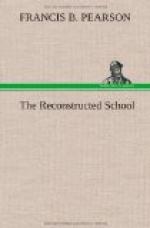If children are asked why they go to school, nine out of ten, perhaps, will reply that they go to school to learn arithmetic, grammar, geography, and history. Asked what their big purpose is in teaching, probably three out of five teachers will answer that they are actuated by a desire to cause their pupils to know arithmetic, grammar, geography, and history. One of the other five teachers may echo something out of her past accumulations to the effect that her work is the training for citizenship, and the fifth will say quite frankly that she is groping about, all the while, searching for the answer to that very question. It would be futile to ask the children why they desire knowledge of these subjects and there might be hazard in propounding the same question to the three teachers. They teach arithmetic because it is in the course of study; it is in the course of study because the superintendent put it there; and the superintendent put it there because some other superintendent has it in his course of study.
Now arithmetic may, in reality, be one of the best things a child can study; but the child takes it because the teacher prescribes it, and the teacher takes it on faith because the superintendent takes it on faith and she cannot go counter to the dictum of the superintendent. Besides, it is far easier to teach arithmetic than it would be to challenge the right of this subject to a place in the course of study. To most people, including many teachers, arithmetic is but a habit of thinking. They have been contracting this habit through all the years since the beginning of their school experience, until now it seems as inevitable as any other habitual affair. It is quite as much a habit of their thinking as eating, sleeping, or walking. If there were no arithmetic, they argue subconsciously, there could be no school; for arithmetic and school are synonymous. Again, let it be said that there is no thought here of inveighing against arithmetic or any other subject of the curriculum. Not arithmetic in itself, but the arithmetic habit constitutes the incubus, the evil spirit that needs to be exorcised.




